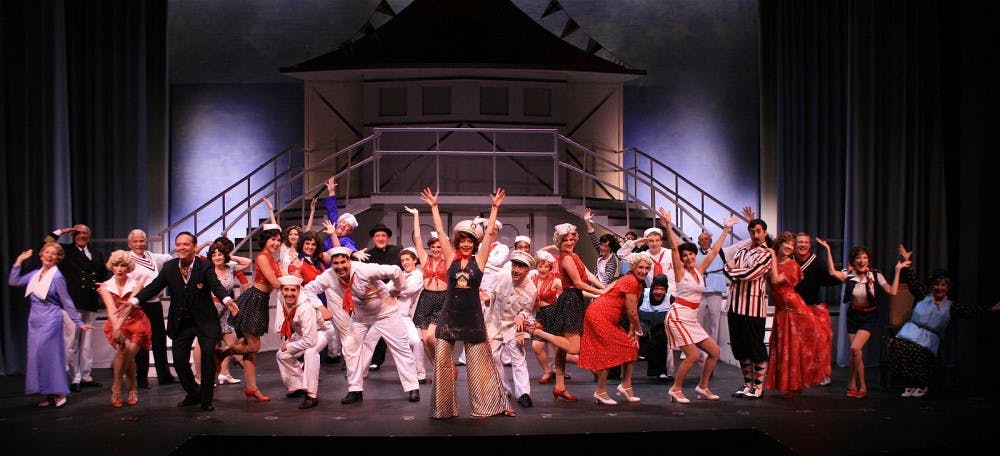It’s 2019. Whitewashing, tacky “Oriental” costumes, and the fetishization of Asian women just aren’t trendy anymore like they might have been back in the good ol’ days. But it seems like Princeton High School didn’t get the memo.
Each spring, PHS presents a musical that involves incredible student effort through its cast, pit orchestra, and tech crew. As an alumna of both Princeton High School and its orchestra, being in those productions was an integral part of my high school experience. It was through them that I laughed, cried, and made music with people who would later go on to become some of my closest friends.
Which is why it was all the more dismaying to find out that this year’s musical, “Anything Goes” (1962), directed by Julianna Krawiecki, checked off callous conflation of Asian cultures and demeaning fetishization of Asian women — nothing short of blatant racism and misogyny. It is not only a disappointment for me, but also for the entire Princeton community that prides itself on diversity and inclusion.
Originally written in 1934, “Anything Goes” is wrought with stereotypes and prejudice, from its hyper-sexualization of the female Chinese character, “Plum Blossom,” to its cheap humor based on the poor English of Chinese characters. Renditions of the musical since its debut have sought to remedy this problem, with varying levels of success. In the case of PHS, even though they did the bare minimum by removing “Chinese accents” from the performance, many scenes from the show were still incredibly racist.
I want to make clear that this is by no means a judgement of the students involved in the production. I understand firsthand how much work goes into each detail; I am in awe of the talent and effort behind every show, knowing that each student is not only involved in the arts, but simultaneously juggling many other endeavors as well. However, it only makes this situation even sadder — the long hours put in by students are tainted by the lack of sensitivity and foresight from the adults who chose this musical and maintained it along the bigoted path which it ultimately took.
Choosing which musical to do is not a decision made on a whim. With that in mind, you really have to wonder: during the entire decision-making process, how did nobody — not the director, not the performing arts supervisor, not the administration — say anything? Didn’t the out-of-place kimonos and straw hats feel weird? Didn’t the scene in which a white male claims to have enjoyed an “unpremeditated romp in the rice” with “Plum Blossom” raise any red flags? The director had the sense to remove “Chinese accents” from the show, which shows that, to a degree, she must have been aware of the musical’s problems. And yet her efforts stopped there.
Perhaps she thought it wasn’t such a big deal — or at least not enough to give up on her vision of the musical. But in any case, it would have only taken a little bit of extra care to circumvent the glaringly racist scenes, all while preserving the character of the show, since they occurred mostly in the dialogue and not the musical numbers. I suppose she didn’t think of the younger siblings in the audience, especially those of Chinese descent, whom this would affect — would they walk away feeling that this was the norm? And that any racially charged bullying they might’ve experienced was suddenly affirmed? Even the high school students themselves were uncomfortable with the show, but had no place or ability to speak out for fear of damaging their grades or future prospects.
At this point, the most important thing is change and prevention. The damage is done. But so far, there hasn’t even been an official apology; it looks like it’ll be swept under the rug — just like everything else PHS has come under fire for in the past. What the school should do is implement a system in which the selection of the musical can be reviewed by more people with a larger range of perspective, such as the diverse student body, thus preventing a ridiculous oversight like this one from happening again. Furthermore, students need an outlet in which they can express their doubts and concerns without fear of personal punishment. As a school district that is well-respected by those nearby, it is so crucial that it makes real change.

Though this happened at PHS, it’s still important for us as University students living in our “Orange Bubble” to pay attention to the surrounding community of which we are inevitably a part. We do not live in a vacuum, and this is a valuable lesson to learn. It is too easy, even at the University, to solely embrace to ideas of inclusion and cultural sensitivity without actually putting in real effort to attain them.
Siyang Liu is a sophomore from Princeton, N.J. She can be reached at siyangl@princeton.edu.









